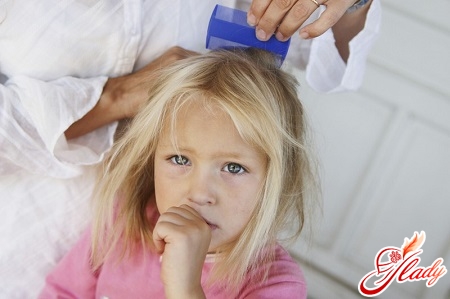 This concept as a syndrome of hyperactivityIt is known to all parents who have small children. Recently, more and more children have been diagnosed with this disorder of the central nervous system. The statistics of pediatricians and psychologists show that hyperactivity occurs in about 39% of all pre-school children, and about 57% of all school-age children. The syndrome of hyperactivity has a fairly large number of manifestations. So, the hyperactive child is the symptoms:
This concept as a syndrome of hyperactivityIt is known to all parents who have small children. Recently, more and more children have been diagnosed with this disorder of the central nervous system. The statistics of pediatricians and psychologists show that hyperactivity occurs in about 39% of all pre-school children, and about 57% of all school-age children. The syndrome of hyperactivity has a fairly large number of manifestations. So, the hyperactive child is the symptoms:
- Attention deficit.
A child with hyperactivity syndrome does not havecan concentrate for a long time on one or another lesson, be it drawing, playing, or even watching television. It is because of the lack of attention that children with hyperactivity syndrome often experience learning difficulties.
- Excessive impulsiveness of the child.
Of course, almost all children - and calm,and not very - from time to time allow themselves violent manifestations of emotions. However, children with the syndrome of hyperactivity especially often lose control over their emotions, often frightening the impulsiveness of even their parents, who are used to everything.
- Increased motor activity of the child.
Children with the syndrome of hyperactivity of anyspecialist can easily determine even in a huge crowd of children. Such children are not just mobile, they are just over active. The baby is almost impossible to see in a calm state - it is constantly in motion. Either he runs, or jumps, or dances on the spot, if they forced him to sit. Everything in this child gives out this most hyperactivity - constantly moving hands, running eyes, facial expressions, facial expressions.
The time at which a child develops hyperactivity disorder
There is a misconception that the firstmanifestations of symptoms of hyperactivity syndrome in a baby can be detected not earlier than the baby will be two years old. However, both doctors and parents of children suffering from the syndrome of hyperactivity, unanimously assert the opposite. The first manifestations of the syndrome of hyperactivity can be detected for the first time after the appearance of crumbs into the light. Such newborn crumbs sleep very little, and their sleep is superficial and restless, they cry very much and cry a lot, and during wakefulness they are very mobile and resemble such mercury balls. As the baby grows, it reminds its parents of a natural disaster - they literally "jump out" of strollers, cots, try to get out of the arenas. Overturned cups, broken dishes, broken from the sides of the bed twigs, overturned flower pots and ragged curtains - troubles pour on such a baby, as if from a fabulous cornucopia. Already grown up crumb, as mentioned earlier, not a minute can sit in one place, listen to the end of a fairy tale or give her mum to cut her nails. The child moves only by running, which causes his mother to run after him a lot. Some parents believe that such activity of the child is just a consequence of the high energy reserve in the baby's body. Is it really? And if really hyperactive children, how to deal with this?
Norm or pathology?
Doctors - neuropathologists and children's psychologistsbelieve that the syndrome of hyperactivity is a fairly serious pathology. If you have a hyperactive child, treatment should be started as early as possible. The increased energy of the child with the syndrome of hyperactivity indicates a violation of the normal functioning of the central nervous system. If the parents notice any deviations, they need to take care of the problem: "Hyperactive child: what to do?" Otherwise, if the parents did not give due importance to this feature of their child's development and did not turn in time for advice and medical help, but only punished the child with the purpose to fix it, as the child grows the problem will only worsen. The child has serious problems first in kindergarten, and after and at school. Specificity of learning one way or another requires diligence and attention. A child with hyperactivity syndrome will not only be unable to perceive and remember information himself, but will also constantly spin and spin, distracting all other children. Because of this, such children are very often observed systematic conflicts with teachers, and parents often listen to a lot of unflattering reviews about the behavior of their children. And this is not surprising, because classes with hyperactive children require certain skills, which in a regular school are not all teachers. Also in school a child with hyperactivity significantly complicates the life of excessive impulsiveness, characteristic of this disease. The child is excessively harsh in actions, judgments, expressions of his thoughts, he first, giving in to the first impulse, says something or does, and only then thinks. And because of this peculiarity of his temperament, a hyperactive child in school faces a lot of problems - relationships with classmates are hopelessly spoiled, the diary is full of teachers' remarks, like a Christmas tree with garlands, and parents go to school with no less periodicity than to work. 
The causes of the syndrome of hyperactivity
Of course, that the syndrome of hyperactivity, like any other disease, does not arise without a reason, from scratch. Provoking factors may include:
- Complicated during pregnancy.
In the event that the future mother suffered fromstrong toxicosis, both the first and second half of pregnancy, from the tendency to increased pressure, if a child has been diagnosed with intrauterine asphyxia, in the future the risk of the syndrome of hyperactivity increases at least three times.
- Lifestyle of a pregnant woman.
On the normal development of the central nervous systemsystems are very negatively influenced by such toxic substances as narcotics, alcohol, nicotine, paint and varnish, heavy metals, and others. A future mother must abandon all addictions, and if her work is directly related to contact with toxic substances, she must write a statement requesting her transfer to easy work. Such a possibility is guaranteed to the pregnant woman by the labor code of the Russian Federation.
- Complicated during the birth process.
Prolonged, prolonged labor, or vice versa,rapid, the use of such obstetrics as forceps, also increases the chances of the child developing the syndrome of hyperactivity. The basis of such a nervous system disorder as hyperactivity is minimal brain dysfunction, which, in fact, is the reason for the learning difficulties of such children. We will not bother our readers with complex and obscure medical terms that characterize minimal brain dysfunction. We offer parents who do not have a corresponding medical education, simply accept for the axiom the following facts:
- Minimal brain dysfunction destabilizes the normal functioning of the central nervous system.
- Violations caused by minimal brain dysfunction require medical treatment - they will not disappear anywhere on their own.
Unfortunately, very often parents do not wantspend time on treatment, mistakenly believing that with age, the problem of the syndrome of hyperactivity will disappear as you grow older. However, the only appearance of a violation that will pass to adolescence is increased motor activity. But impulsivity and attention deficit, on the contrary, to a large extent and quickly enough, making the learning process extremely difficult. And the child experiences the greatest difficulty with a letter and a speech. Classes with hyperactive children should be conducted on an individual basis.
Features of communication with hyperactive children
Despite all his love for the child, parentshyperactive children very often in communication with them lose their last patience and fail. Some moms and dads just waving their arms to their children, noting with a heavy sigh that they will not get the better of it anyway. Other parents, on the other hand, try to discipline the child with the most rigorous methods, quite rigidly suppressing the slightest attempts at disobedience. It is impossible to say unambiguously which tactic of parents' behavior is more correct - it all depends on the specific case and each particular child. For some people, "jagged mittens" is the only way to keep a child within limits, and for someone, every rude word is a real psychological trauma. Watch your child's reaction to observations carefully - and you will very quickly understand what is needed for the crumbs. If to you, despite all your efforts, and it was not possible to pick up a key to your kid, address for professional help to the children's psychologist. Many parents are embarrassed by the visit to this specialist, confusing him with a psychiatrist. However, these are completely different orientations, and a visit to a psychologist is not an indication that your child is suffering from any kind of mental disorders. By the way, hyperactive children in kindergarten most often automatically fall under the supervision of a psychologist. By the way, if you have a hyperactive child, how to treat it, the doctor should decide only. Many parents buy sedative sedatives in the pharmacy and start giving them to their baby. Remember that an incorrectly selected pharmacological preparation can significantly aggravate the course of the disease. But the most important thing that parents of hyperactive children need to realize is the fact that a child is so violent and active in no way because he wants to annoy them. All his antics are a consequence of the peculiarities of the work of his nervous system, often they are beyond the control of the baby. But emotional outbursts of parents, whose nerves are already at the limit, will not bring any positive result, but they can significantly aggravate the situation. Despite the fact that every child suffering from the syndrome of hyperactivity needs an individual approach, the peculiarities of their psychology make it possible to give some recommendations common to all children that facilitate the education of a hyperactive child:
- Formulation of the problem.
Features of the development of children with the syndromehyperactivity are such that logical and abstract thinking in them is much worse. That is why such a child needs to put only a clearly marked task. Proposals should be as concise as possible, not carrying any unnecessary semantic load. Try to avoid long sentences.
- The sequence of instructions.
It is highly discouraged to give a childa syndrome of hyperactivity at once some tasks, for example: "collect toys, wash hands and go to have dinner". To perceive all the information at once to the child will be rather difficult and, most likely, he will not carry out any instructions, distracted by something else. It is much more reasonable to give these instructions to the crumb in a logical sequence.
- Outline the time frame.
These children have a very vague idea of thesense of time, so watch for yourself the time allotted for the fulfillment of each of your instructions. By the way, if you want to take the baby from the street, feed him, put him to sleep - always warn him minutes before your action. And this applies not only to children with hyperactivity syndrome, but all the others.
- Correctly say no.
Properly speaking, just the word "no"use and can not. Prohibiting anything to a child, build your suggestions in such a way that there is no negation in it. For example, if you want a child not to run on the grass, do not say to him: "Do not run on the grass!". A much greater effect will have the following effect: "Go to the path." And, of course, in all, even conflict situations, parents should remain calm.
- How to calm a hyperactive child
If your baby is overexcited,try to change the situation to a more peaceful one, for example, take the child to another room, offer him water, calmly talk to him on any abstract topic. Concluding the talk about childhood hyperactivity, I would like to remind parents once again that they are not alone - there are also qualified neurologists close to you who know exactly how to treat hyperactivity in children. A properly selected comprehensive course of therapy can greatly improve a child's condition. In addition to neurologists, you can ask for help from child psychologists who will tell you how to educate a hyperactive child. And remember - your baby is just as good as other children, it's just special. Good luck and patience! We advise you to read:









